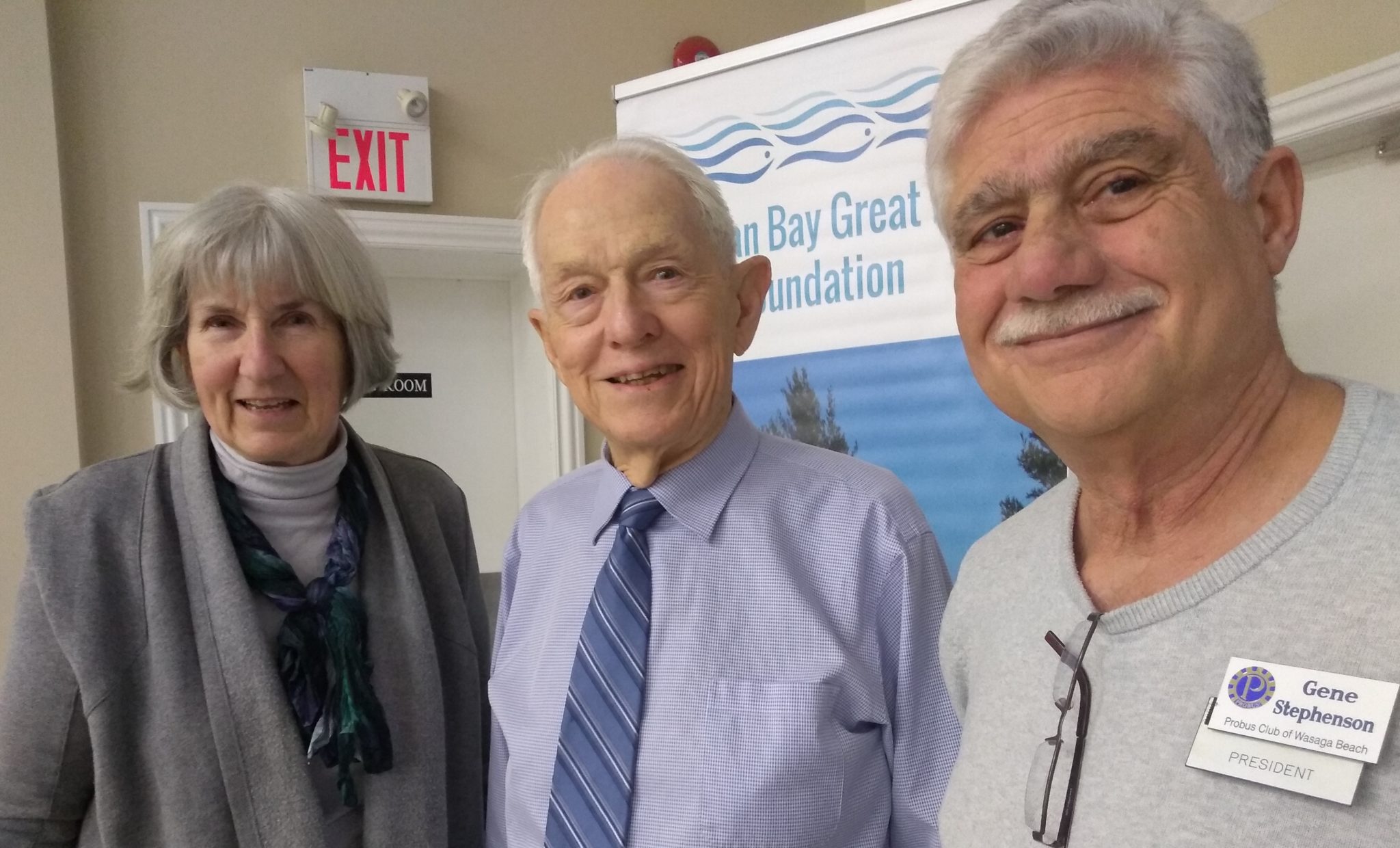Grass Carp lurk where politics muddies the waters

Georgian Bay Great Lakes Foundation chair Mary Muter and vice-chair Roy Schatz with Wasaga Beach Men’s Probus Club president Gene Stephenson. -Kate Harries photo
By Kate Harries Springwater News
There’s a chance that one of the greatest threats to the health of the Great Lakes can be turned back, the Wasaga Beach Men’s Probus Club heard last week.
But progress towards stopping a Grass Carp invasion has been hard-fought and tortuous, said Mary Muter, chair of the Georgian Bay Great Lakes Foundation, displaying photographs of the huge fish being held proudly aloft by U.S. anglers.
“The Americans love these fish because they (the Americans) have wiped out so many of their native fishery, they think these are fun to catch,” she told club members at their monthly meeting.
Muter does not consider the Grass Carp an interesting sport fish, because they don’t move, they just get reeled in as dead weight. But the payoff comes when the angler hoists the 50-pound monster for a photo op – after which it is released back into the water.
The Grass Carp is one of four species of Asian carp the US Environmental Protection Agency (EPA) allowed to be introduced in the 1970s to control algae in aquatic farms by the Mississippi River. Voracious and invasive, they can lay waste to all the plants in a wetland, eliminating native fish species habitat.
In 2018 Muter attended a Toronto meeting of the International Association for Great Lakes Research. One of only two Canadians at the $1,000 registration event, she was “appalled” to discover that staff from the Ohio and Michigan departments of natural resources and Michigan State University were doing “research” into the Grass Carp – catching the fish, equipping them with tracking devices and releasing them back into Lake Erie.
Grass Carp are now reproducing in two of the lake’s tributary rivers, the Sandusky and Maumee, and can be found in Lake Erie but are not believed to be “established,” only “present” there.
The researchers tracked the fish they released to the northwest corner of Lake Erie, but admitted that they were unable to find about a third of their subjects and assumed they had died.
“That’s unacceptable,”Muter said. “I said, you have no grounds to assume that they have died. Many of them may also have swum up into Lake Huron.”
And in fact, the following year, in 2019, nine Grass Carp were found for the first time in Lake Huron.
Muter was outraged at the role played by the state and university scientists who – instead of working to stop the menace, were studying it. And getting well paid to do so.
The battle lines were drawn.
“Our organization went to the wall on this,” Muter said.
“It was not easy,” she explained, because Michigan State University was getting $1 million from Washington for this research and was sharing the money among other agencies, including the US Fish and Wildlife service.
Georgian Bay Great Lakes Foundation launched a petition calling on the US EPA and the states of Ohio and Michigan to undertake a full-scale eradication program.
Muter reached out for support in her campaign to a number of organizations and agencies. One of the first she turned to was the Ontario Ministry of Natural Resources and Forestry. They refused to become involved. “They said, oh we have to be careful, we can’t say anything because Ohio and Michigan DNR, those are our partners on the south side of the Great Lakes.”
She also got in touch with another “big Ontario organization that gets a lot of money from the provincial government and I said, are you people going to speak out on this?” She was told the organization would have to talk to their partners, US Fish and Wildlife. Some days later, she was told the organization would not be pressing for meaningful action on the Grass Carp threat.
Contacted after the meeting, Muter declined to name the organization.
Last fall, Muter went to a State of Lake Huron conference in Saginaw, Michigan, and spoke out there, saying, “we want an eradication program. we want it to begin now, we want this research to end.”
Unknown to her, while she was speaking, a US congressman walked into the conference. Dan Kildee, a Democrat from Michigan, spoke after her, to announce that the House and the Senate had just approved $1 million to eradicate Grass Carp from the Great Lakes.
“I was so happy to hear that.”
When she went to thank him, Kildee told her that years earlier, he had biked from Sarnia to Tobermory. “He said, you have a beautiful country, you’ve got pristine water, pristine wetlands you’ve still got a native fishery…. If I was a Canadian and I was here at a meeting like this, I would be standing up at the front saying, what the hell are you Americans doing? Why don’t you get rid of these fish?”
The $1 million appropriation will go to the Great Lakes Fisheries Commission, a bi-national organization with representatives from all eight Great Lakes US states and Ontario, which is preparing now for how it will end the Grass Carp invasion this summer.
In an interview, Muter said she feels there’s a chance the invader can be eradicated from the Great Lakes “if they do it aggressively.”
This is the first in a two-part series on the Great Lakes. Next issue: The fundamental unfairness of discharges from Lake Superior.









[…] https://aware-simcoe.ca/2020/02/grass-carp-lurk-where-politics-muddies-the-waters/ […]